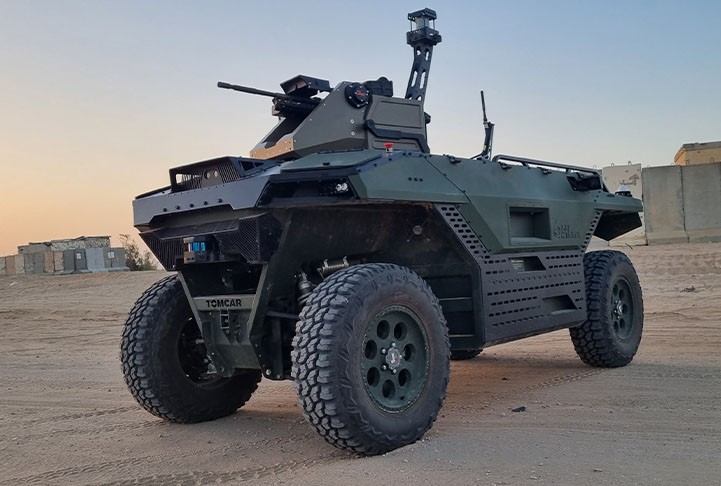
Lauren Moye, FISM NEWS
[elfsight_social_share_buttons id=”1″]
Israel introduced the latest addition to their advanced robotic military technology on Sept. 14. REX MKII, a vehicle capable of being equipped with two machine guns, is expected to soon be used to patrol the conflict-prone Palestinian border. This Israeli armed robot has also renewed human rights concerns over the use of unmanned technology in battles. .
Israel Aerospace Industries (IAI), a state-owned company, revealed their new vehicle at the 2021 Defense and Security Equipment International held in London. REX MK11 is a larger version of the armed Jaguar robots that already patrol the Gaza Strip. While the Jaguars are equipped with only one machine gun, the REX MK11 can use two guns to inflict greater potential damage in conflict.
REX MK11 is also equipped with sophisticated sensors and cameras to make it an effective surveillance vehicle, and artificial intelligence which allows it to “learn” from its missions. Yonni Gedj, an operational expert for IAI, told Time, “With every mission, the device collects more data which it then learns from for future missions.”
IAI unveils REX MK II multi-mission unmanned vehicle
It's a hybrid electric platform, all-wheel drive, for gathering intelligence, provides logistical support & execute remote attacks. The vehicle is autonomous with command/control capabilities or through wireless communication. pic.twitter.com/tLwbf1s3pU
— Vayu Aerospace Review (@ReviewVayu) September 13, 2021
Human rights activists are most concerned about the combination of artificial intelligence with armed military capabilities.
The Israeli military has announced that it plans to maintain human control of the robot through the use of a tablet. This means that the robot is not in control life-or-death decisions if it encounters potential hostiles. “It is possible to make the weapon itself also autonomous, however, it is a decision of the user today,” Rani Avni, the IAI deputy head over autonomous weapons, said. “The maturity of the system or the user is not there yet.”
Instead, IAI touts that the robotic technology is a way to preserve the life of Israeli military personnel. Zvika Yarom, GM Land Division of IAI, said, “The need to support ground forces in the field to carry out various missions while minimizing threats to soldiers’ lives is at the heart of our values here at Israel Aerospace Industries.”
In addition to patrolling areas where engaging hostiles is more likely, the vehicle can also assist in carrying injured soldiers to safety and move supplies.
While Israel has intentionally developed robotic technology to help reduce the loss of life of their own civilians, they have also been intentional in keeping humans involved in the decision to take the life of their enemies. In a 2019 interview involving a similar discussion about the ethics of machines in war, Brigadier-General Yaniv Rotem told Reuters, “At the end of the day, it is the man in the vehicle who takes the decision. You need someone who thinks more than a machine.”
